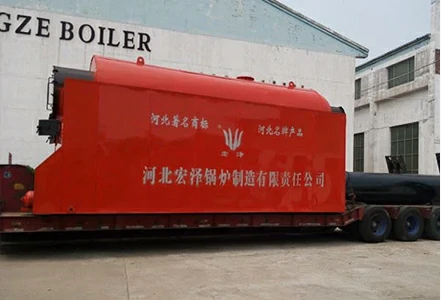
Noy . 29, 2024 14:32 Back to list
Understanding Industrial Steam Boiler Systems for Efficient Operation and Maintenance
The Industrial Steam Boiler System A Backbone of Modern Industry
Industrial steam boiler systems are essential components of many manufacturing and processing operations. They provide the necessary steam required for various applications such as power generation, heating, and even sanitation processes. With advancements in technology and a growing emphasis on energy efficiency and sustainability, modern steam boiler systems have evolved significantly, leading to increased performance, reliability, and environmental considerations.
Understanding Steam Boilers
At its core, a steam boiler is a closed vessel that uses fuel, electricity, or other energy sources to produce steam by heating water. The steam generated is then used for processing, heating, and other industrial applications. There are several types of steam boilers, each designed to meet specific needs. The most common types include fire-tube boilers, water-tube boilers, and electric steam boilers.
Fire-tube boilers, one of the oldest types of steam boilers, contain hot gases produced from combustion that pass through tubes surrounded by water. This design enables efficient heat transfer and allows for smaller size and lower cost. However, they may be limited in pressure capacity compared to water-tube boilers. On the other hand, water-tube boilers are designed to handle higher pressures and are used in applications requiring large volumes of steam. Electric steam boilers, while less common, provide a clean and efficient alternative for small-scale applications.
The Importance of Industrial Steam Boiler Systems
The role of steam boilers in industrial operations cannot be overstated. They are integral to many processes and applications. In chemical and pharmaceutical manufacturing, for instance, steam boilers provide the necessary heat for reactors, drying processes, and distillation. In food processing, steam is used for cooking, sterilization, and cleaning. Additionally, many manufacturing facilities rely on steam for heating, power generation, and driving various equipment.
Furthermore, steam systems can be exceptionally versatile. They can be used in combination with heat exchangers, turbines, and other technologies to improve energy efficiency and recover waste heat. These systems can significantly lower operational costs and minimize environmental impact, aligning with modern sustainability goals.
industrial steam boiler system

Advancements in Technology
Recent technological advancements have transformed industrial steam boiler systems. Modern boilers are equipped with advanced controls, allowing for improved efficiency and safety. For instance, automated systems can adjust the fuel and air supply based on demand, leading to optimized combustion performance. Condensing economizers and heat recovery systems are increasingly employed to capture waste heat, enhancing overall system efficiency.
Moreover, innovations in materials technology have improved the durability and longevity of boiler components. High-strength alloys can withstand extreme temperatures and pressures, reducing the frequency of maintenance and extending the lifespan of the equipment. These improvements not only enhance operational efficiency but can also lead to cost savings for industries.
Environmental Considerations
In an era of increasing environmental awareness, industrial steam boiler systems are also adapting to meet stricter regulations and sustainability standards. Emission control technologies, such as selective catalytic reduction (SCR) and flue gas desulfurization (FGD), are being integrated into boiler systems to reduce harmful emissions. Additionally, many industrial facilities are exploring alternative fuels, such as biomass, biogas, and hydrogen, as viable options for steam production.
The push for decarbonization has led to the development of green technologies and processes. Companies are investing in energy-efficient systems and exploring combined heat and power (CHP) systems that utilize waste heat for additional energy generation. These efforts not only reduce the carbon footprint but can also enhance competitiveness in a rapidly changing energy landscape.
Conclusion
Industrial steam boiler systems are a crucial element of the modern industrial sector. As technology advances and sustainability becomes a paramount concern, these systems are evolving to meet new challenges and opportunities. With a focus on efficiency, reliability, and environmental responsibility, industrial steam boilers are set to continue playing a pivotal role in powering industries for years to come. As we move forward, embracing innovation and sustainable practices will be key to maximizing the benefits of steam systems while minimizing their impact on the environment.
-
Oil Fired Hot Water Boilers Sale - High Efficiency & Affordable
NewsJul.31,2025
-
High-Efficiency Commercial Oil Fired Steam Boiler for Industry
NewsJul.30,2025
-
High-Efficiency Biomass Fired Thermal Oil Boiler Solutions
NewsJul.30,2025
-
High Efficiency Gas Fired Thermal Oil Boiler for Industrial Heating
NewsJul.29,2025
-
High-Efficiency Gas Fired Hot Water Boiler for Sale – Reliable & Affordable
NewsJul.29,2025
-
High Efficiency Biomass Fired Hot Water Boiler for Industrial and Commercial Use
NewsJul.29,2025
Related PRODUCTS






















